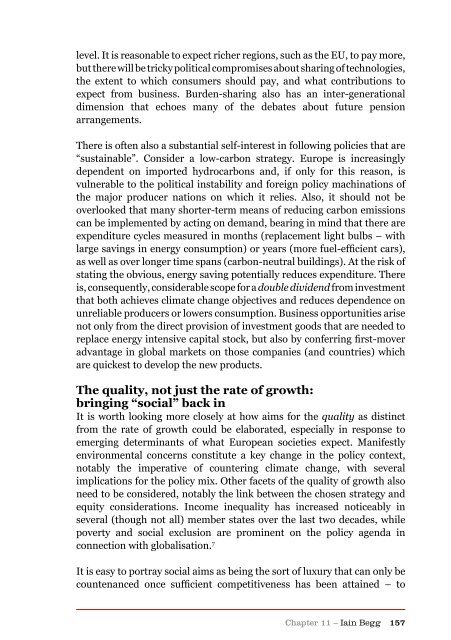Authors Iain Begg | Gabriel Glöckler | Anke Hassel ... - The Europaeum
Authors Iain Begg | Gabriel Glöckler | Anke Hassel ... - The Europaeum
Authors Iain Begg | Gabriel Glöckler | Anke Hassel ... - The Europaeum
Create successful ePaper yourself
Turn your PDF publications into a flip-book with our unique Google optimized e-Paper software.
level. It is reasonable to expect richer regions, such as the EU, to pay more,<br />
but there will be tricky political compromises about sharing of technologies,<br />
the extent to which consumers should pay, and what contributions to<br />
expect from business. Burden-sharing also has an inter-generational<br />
dimension that echoes many of the debates about future pension<br />
arrangements.<br />
<strong>The</strong>re is often also a substantial self-interest in following policies that are<br />
“sustainable”. Consider a low-carbon strategy. Europe is increasingly<br />
dependent on imported hydrocarbons and, if only for this reason, is<br />
vulnerable to the political instability and foreign policy machinations of<br />
the major producer nations on which it relies. Also, it should not be<br />
overlooked that many shorter-term means of reducing carbon emissions<br />
can be implemented by acting on demand, bearing in mind that there are<br />
expenditure cycles measured in months (replacement light bulbs – with<br />
large savings in energy consumption) or years (more fuel-efficient cars),<br />
as well as over longer time spans (carbon-neutral buildings). At the risk of<br />
stating the obvious, energy saving potentially reduces expenditure. <strong>The</strong>re<br />
is, consequently, considerable scope for a double dividend from investment<br />
that both achieves climate change objectives and reduces dependence on<br />
unreliable producers or lowers consumption. Business opportunities arise<br />
not only from the direct provision of investment goods that are needed to<br />
replace energy intensive capital stock, but also by conferring first-mover<br />
advantage in global markets on those companies (and countries) which<br />
are quickest to develop the new products.<br />
<strong>The</strong> quality, not just the rate of growth:<br />
bringing “social” back in<br />
It is worth looking more closely at how aims for the quality as distinct<br />
from the rate of growth could be elaborated, especially in response to<br />
emerging determinants of what European societies expect. Manifestly<br />
environmental concerns constitute a key change in the policy context,<br />
notably the imperative of countering climate change, with several<br />
implications for the policy mix. Other facets of the quality of growth also<br />
need to be considered, notably the link between the chosen strategy and<br />
equity considerations. Income inequality has increased noticeably in<br />
several (though not all) member states over the last two decades, while<br />
poverty and social exclusion are prominent on the policy agenda in<br />
connection with globalisation. 7<br />
It is easy to portray social aims as being the sort of luxury that can only be<br />
countenanced once sufficient competitiveness has been attained – to<br />
Chapter 11 – <strong>Iain</strong> <strong>Begg</strong> 157

















